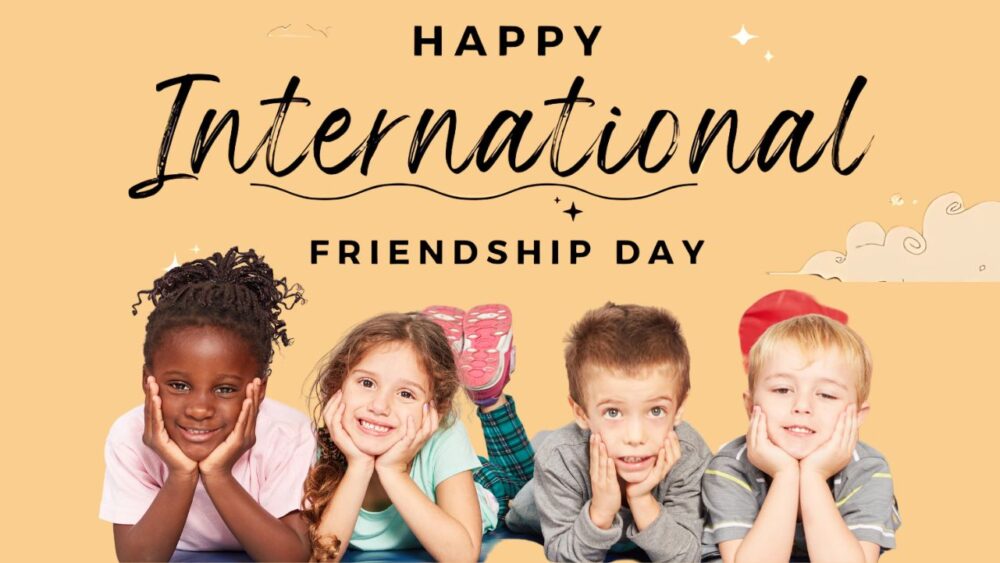

Home > News > Inclusive Friendships: How International Friendship Day Can Uplift Kids Without Support

Written by Leon B. Wellington, President | Published: August 5, 2024 at 5:23 am
Have you ever thought about how friendships can change a child’s life? On International Friendship Day, celebrated every year on August 4th, we get a chance to recognize the powerful impact of friendships. For children without support, friendships can be a beacon of hope and a source of emotional and social stability.
Friendship plays a crucial role in a child’s development, teaching them essential life skills like sharing, empathy, and cooperation.
According to the United Nations, the International Day of Friendship aims to foster understanding, respect, and reconciliation among communities (United Nations). This day encourages activities that bring people together, promoting peace and unity. Imagine how much more we can achieve if we extend these efforts to include children who lack the support they need.
By focusing on building inclusive friendships, we can help uplift these children, providing them with the emotional and social foundation they need to thrive. Keep reading to learn more about the importance of friendships and how you can make a difference in a child’s life.
Friendships are essential for children’s emotional and social development. They provide a sense of belonging and security. Research shows that children who have strong friendships tend to have higher self-esteem and are better at handling stress (Frontiers).
Friendships help children develop social skills, such as communication, cooperation, and conflict resolution. By celebrating International Friendship Day, we can highlight these benefits and encourage children to build and maintain healthy friendships.
International Friendship Day is an excellent opportunity to promote inclusivity among children. Activities like friendship bracelet making, pen pal programs, and group games can help children learn to appreciate diversity and build bonds with their peers. These activities not only foster new friendships but also teach children the importance of acceptance and understanding.
Schools play a vital role in fostering friendships among children. By incorporating activities that promote teamwork and cooperation, teachers can help students develop strong bonds with their classmates. Celebrating Friendship Day in schools can reinforce the values of kindness and empathy, creating a supportive and inclusive environment for all students.
Friendships have a significant impact on mental health. Children who have strong friendships are less likely to experience loneliness and depression (Frontiers). They are more resilient and better able to cope with challenges.
On International Friendship Day, we can raise awareness about the mental health benefits of friendships and encourage children to support one another.
Children without support, such as those in foster care or orphanages, often struggle to form lasting friendships. By organizing Friendship Day events that include these children, we can help them build connections and feel valued.
These events can provide a safe space for children to meet new friends and develop meaningful relationships.
In today’s digital age, technology plays a crucial role in friendships. Social media and messaging apps can help children stay connected with their friends, even when they are physically apart.
However, it’s essential to ensure that children use technology safely and positively. On International Friendship Day, we can teach children how to use technology to build and maintain healthy friendships.
Parents play a crucial role in helping their children develop friendships. By encouraging their children to participate in social activities and teaching them the values of kindness and empathy, parents can help their children form strong and lasting friendships.
International Friendship Day is an excellent opportunity for parents to reinforce these values and support their children’s social development.
Communities can play a significant role in supporting inclusive friendships. By organizing events and activities that bring children together, communities can help foster a sense of belonging and inclusion. Friendship Day provides an opportunity for communities to celebrate diversity and encourage children to form new friendships.
Children with special needs often face challenges in forming friendships. By organizing inclusive Friendship Day activities that cater to their needs, we can help these children build meaningful connections with their peers. These activities can provide a safe and supportive environment for all children to come together and celebrate their differences.
Donating to organizations that support children’s friendships can make a significant impact. Your contributions can help fund programs and activities that promote inclusivity and support for children without support.
By donating to EFCC, you can help create opportunities for children to form lasting friendships and build a brighter future
International Friendship Day is more than just a celebration of bonds; it’s a chance to make a real difference in the lives of children without support. By promoting inclusive friendships, we can help uplift these children and provide them with the emotional and social foundation they need to thrive.
Support children today by visiting efccinc.org and making a donation. Together, we can create a world where every child has the opportunity to experience the joy and benefits of true friendship.
If this article has been helpful to you, share your thoughts with us at info@efccinc.org.
To keep abreast of our latest news and events subscribe to our newsletter by clicking the SUBSCRIBE BUTTON.
Written by Leon B. Wellington, President
Written by Leon B. Wellington, President
Written by Leon B. Wellington, President
Written by Leon B. Wellington, President
Written by Leon B. Wellington, President